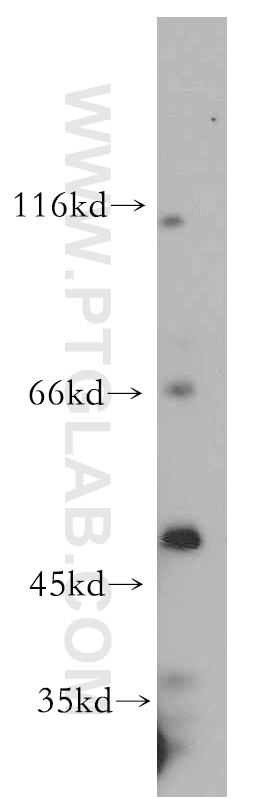Tested Applications
| Positive WB detected in | K-562 cells |
Recommended dilution
| Application | Dilution |
|---|---|
| Western Blot (WB) | WB : 1:500-1:2000 |
| It is recommended that this reagent should be titrated in each testing system to obtain optimal results. | |
| Sample-dependent, Check data in validation data gallery. | |
Published Applications
| WB | See 1 publications below |
Product Information
10129-2-AP targets NFYC in WB, ELISA applications and shows reactivity with human samples.
| Tested Reactivity | human |
| Cited Reactivity | mouse |
| Host / Isotype | Rabbit / IgG |
| Class | Polyclonal |
| Type | Antibody |
| Immunogen |
CatNo: Ag0140 Product name: Recombinant human NFYC protein Source: e coli.-derived, PGEX-4T Tag: GST Domain: 1-251 aa of BC005003 Sequence: MSTEGGFGGTSSSDAQQSLQSFWPRVMEEIRNLTVKDFRVQELPLARIKKIMKLDEDVKMISAEAPVLFAKAAQIFITELTLRAWIHTEDNKRRTLQRNDIAMAITKFDQFDFLIDIVPRDELKPPKRQEEVRQSVTPAEPVQYYFTLAQQPTAVQVQGQQQGQQTTSSTTTIQPGQIIIAQPQQGQTTPVTMQVGEGQQVQIVQAQPQGQAQQAQSGTGQTMQVMQQIITNTGEIQQIPVQLNAGQLQYI Predict reactive species |
| Full Name | nuclear transcription factor Y, gamma |
| Calculated Molecular Weight | 37 kDa, 50 kDa |
| Observed Molecular Weight | 48 kDa |
| GenBank Accession Number | BC005003 |
| Gene Symbol | NFYC |
| Gene ID (NCBI) | 4802 |
| RRID | AB_2152244 |
| Conjugate | Unconjugated |
| Form | Liquid |
| Purification Method | Antigen affinity purification |
| UNIPROT ID | Q13952 |
| Storage Buffer | PBS with 0.02% sodium azide and 50% glycerol, pH 7.3. |
| Storage Conditions | Store at -20°C. Stable for one year after shipment. Aliquoting is unnecessary for -20oC storage. 20ul sizes contain 0.1% BSA. |
Background Information
NFYC, also named as Nuclear transcription factor Y subunit gamma or Transactivator HSM-1/2, is a 458 amino acid protein, which belongs to the NFYC/HAP5 subunit family. NFYC localizes in the nucleus and stimulates the transcription of various genes by recognizing and binding to a CCAAT motif in promoters, for example in type 1 collagen, albumin and beta-actin genes. SP1, NFYC and FOXO3, FOXO4 transcription factors are involved in the regulation of STK11 transcription.
Protocols
| Product Specific Protocols | |
|---|---|
| WB protocol for NFYC antibody 10129-2-AP | Download protocol |
| Standard Protocols | |
|---|---|
| Click here to view our Standard Protocols |




